Cognizant is betting that it can embed agentic AI across enterprises, expand its total addressable market and drive what it calls "hyper-productivity" for its customers.
The strategy will be driven by the ability to design enterprise AI agents that work across systems, create industry-specific large language models and build its own platforms such as Cognizant Neuro AI, which is built on Nvidia's stack.
At Nvidia's GTC 2025 conference, Cognizant appeared in multiple sessions and highlighted customers such as Trane as well as industry AI efforts in healthcare and manufacturing. The upshot is that Cognizant is looking to enable multi-agent systems across multiple industries and create "AI agent factories."
Speaking at Cognizant's Investor Day, CEO Ravi Kumar said the company has always been interested in finding marketplace gaps, fixing those problems and productizing it with services. "We have now done that for AI, which is evolving at a rapid pace. I call it last mile infrastructure as well," said Kumar. "Every software ecosystem is building agents. We built an orchestration layer, which we believe is a gap today, and can get agents from different ecosystems to talk to each other and generate the kind of productivity clients are looking for."
- Enterprises will spend on agentic AI, but perhaps not yet
- The data wars are just starting and agentic AI may be a trigger
- AI agents bring consumption models to SaaS: Goldilocks or headache?
- Agentic AI: Three themes to watch for 2025
- Agentic AI without process optimization, orchestration will flop
- AI? Whatever. It's all about the first party data
- Enterprise AI: Here are the trends to know right now
While IT services companies could be disrupted by agentic AI, there's a strong case to be made that these integrators are best positioned to do well building AI agent systems. Why? These systems integrators work horizontally across business functions, have domain expertise and industry-specific knowledge.
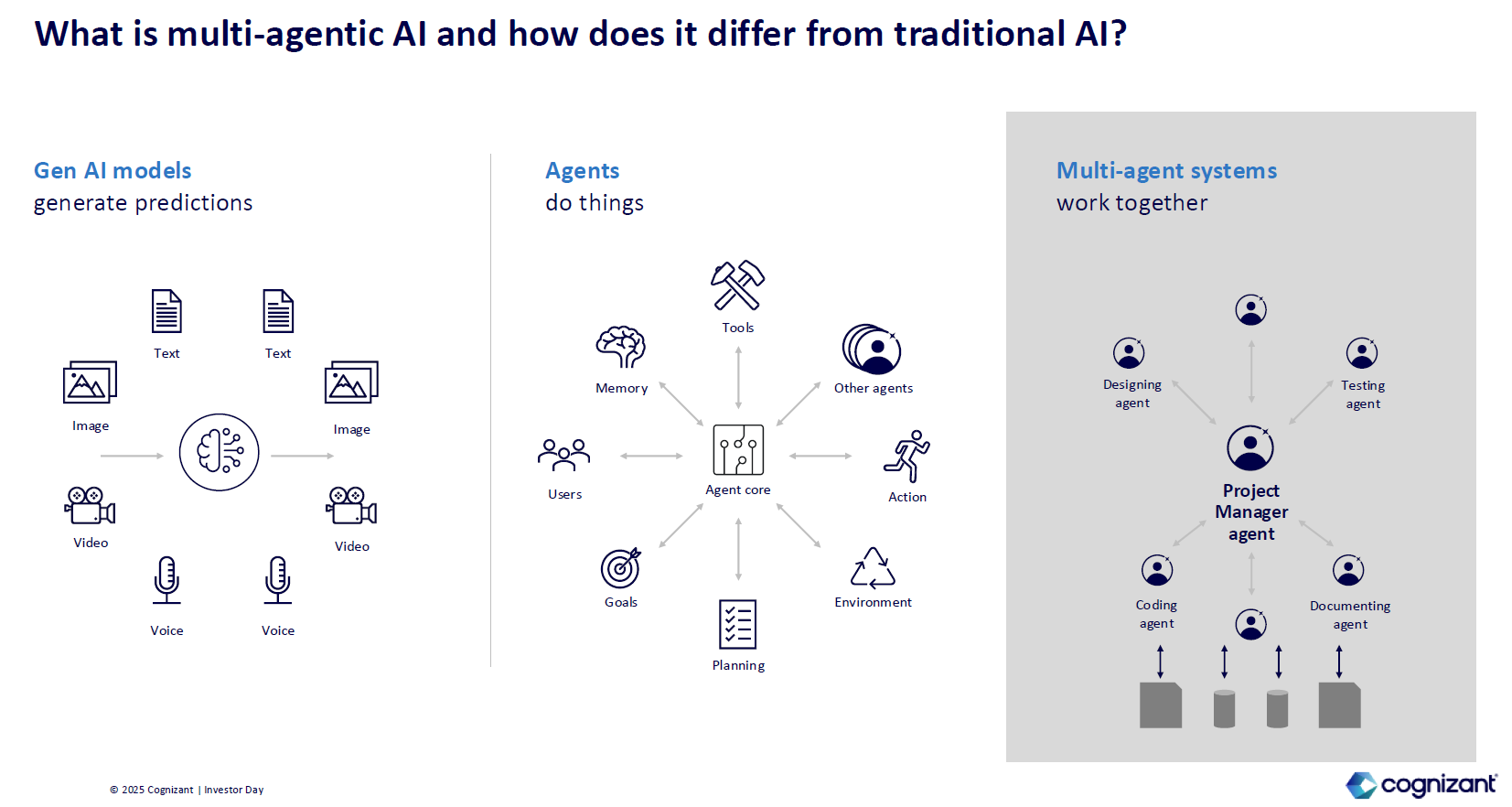
Speaking on DisrupTV, Constellation Research CEO Ray "R" Wang set the scene.
"One of the things we discovered, especially with agents, is that system integrators and services companies have done an amazing job building agents. Part of it is the fact that when you have to cut across departments and functional features and work across business processes. You have to be really good at integration. The agent is really an API tied to a decision engine. Being able to see what a business needs to do across the board really makes it work. This level of strategic AI integration is going to be important."
The plan
Cognizant's plan for going forward revolves around artificial intelligence and embedded engineering.
For AI, Kumar said Cognizant is focused on using AI to enable hyper productivity, industrializing AI and "agentifying the enterprise." Investments in AI include labs, development of its Neuro suite platforms, multi-agent orchestration and frameworks.
Today, Cognizant is enabling hyper productivity with industrializing AI and agentification taking place between 2025 and beyond 2030. "We are unlocking thousands of use cases at the rapid pace, and the models are getting cheaper and cheaper, which means the value will move from the infrastructure to the front, and enabling that hyper productivity for our clients, industrializing AI and agentifying the enterprise," said Kumar, who added that more than 100 pilot programs with customers are focused on agentic AI.
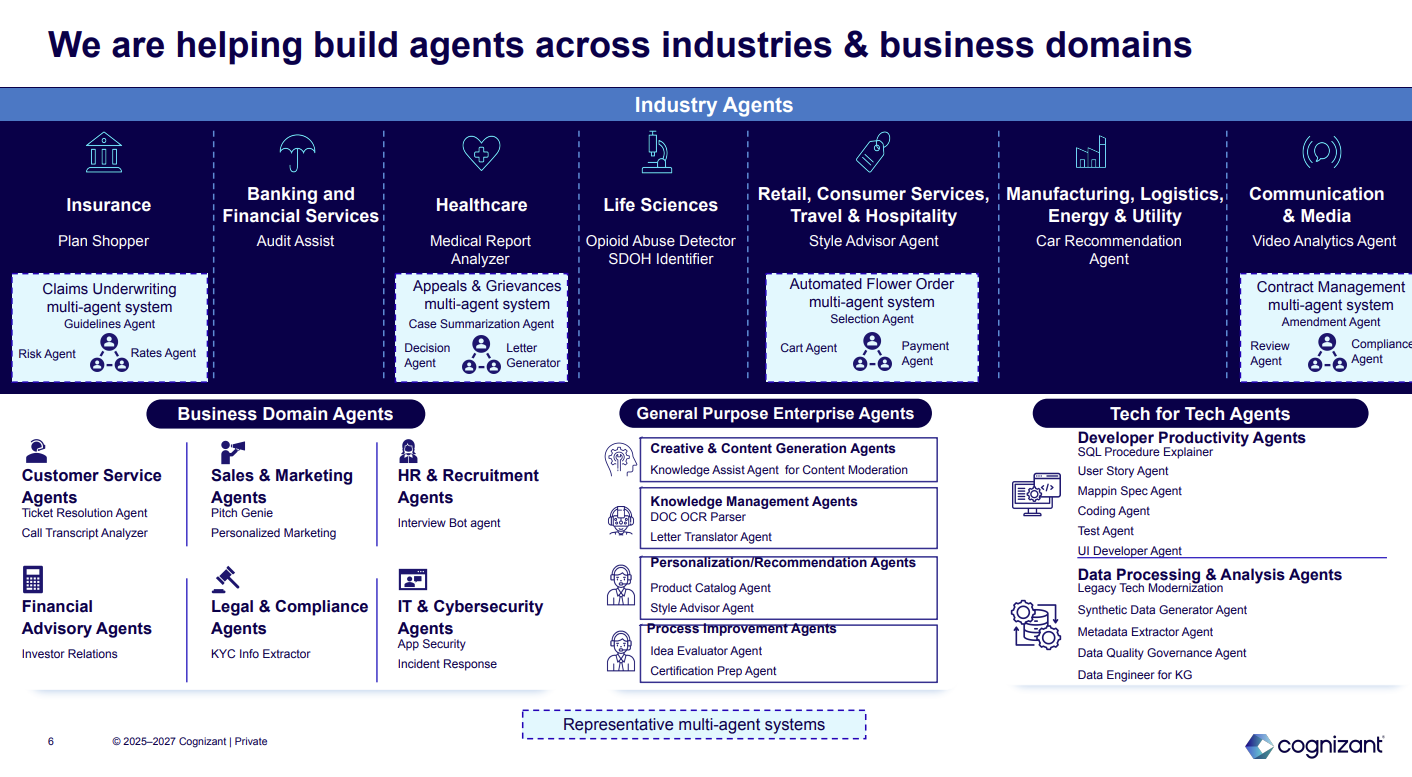
Prasad Sankaran, EVP of software and platform engineering at Cognizant, said enterprises have moved to lower tech debt, but AI is bringing a rapid pace of new technologies. Cognizant's platforms can "satisfy that last mile challenge for our clients," said Sankaran. "Customers can take our platform and directly connect to that last mile connectivity for AI," he said.
- Cognizant: AI savvy consumers will drive spending, demand new experiences
- Cognizant CEO Kumar: GenAI hyperproductivity will need to be self-funded
- Cognizant Takes Flight: Acquisition of Belcan Signals Aerospace and Federal Ambitions
Kumar said Cognizant is also very interested in rewiring the tech stack from the data to cloud to user experience. "We want to rewire the experience layer with Cognizant Moment, which is about making the UI generative," said Kumar. "We believe just in time design is the user interface."
For embedded engineering, Cognizant is focused on digital and physical (phygital) product engineering, smart manufacturing and autonomous systems. Investments for embedded engineering include smart mobility labs, industry 4.0, embedded systems, IT and operational technology in manufacturing, and edge computing.
Vibha Rustagi, SVP and global head of Cognizant IoT and engineering, said her group sees a big market in making industries such as medical, manufacturing and retail digital. Cognizant has a digital twin partnership with AWS and Nvidia to "drive optimization in the AI, optimization in the factories, and make it more autonomous."
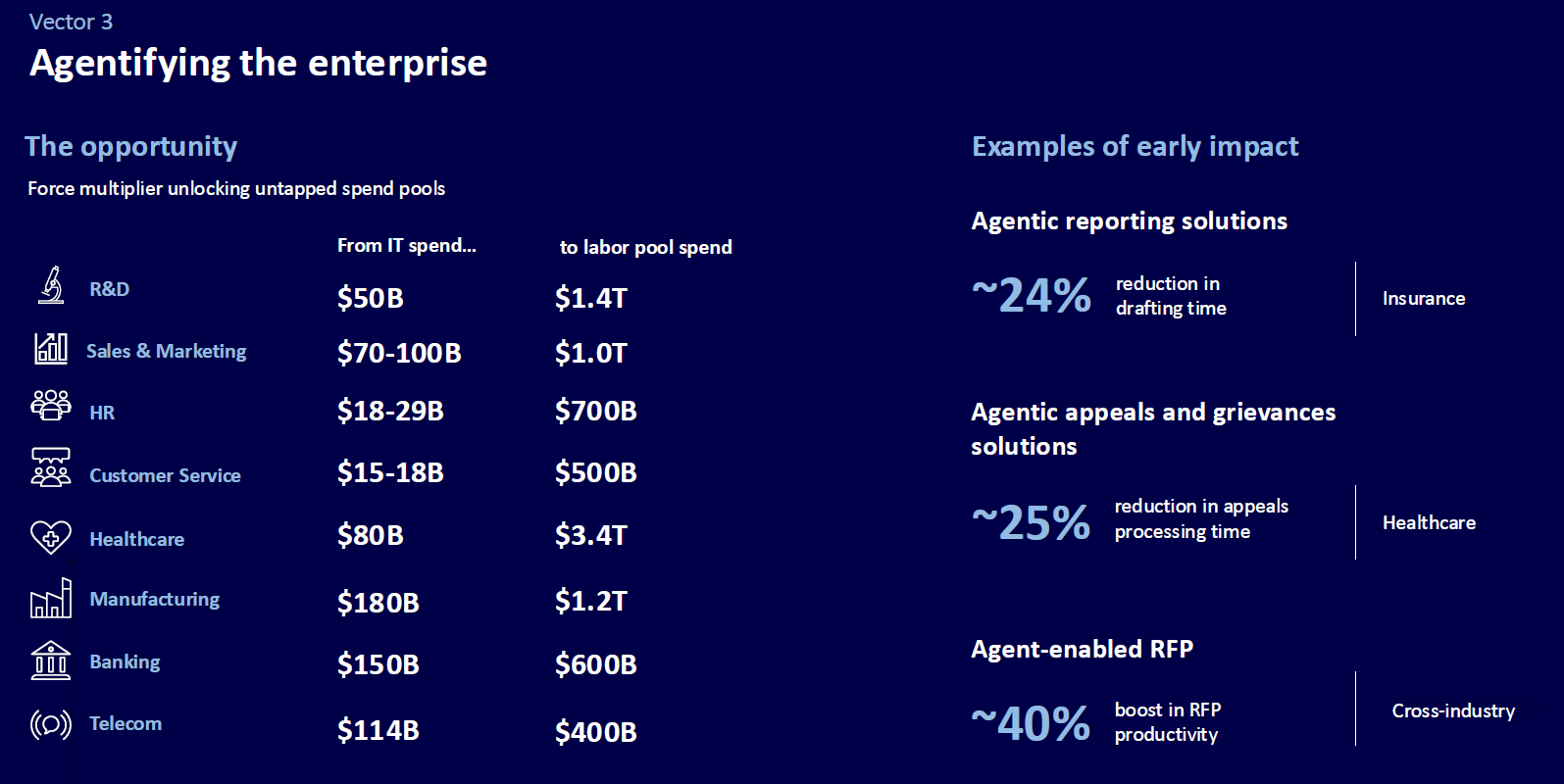
Rewiring the stack for agentic AI
For Cognizant, setting customers up for agentic AI will require rewiring of enterprise stacks to leverage data and cloud infrastructure.
Nearly 40% of Cognizant's revenue comes from data transformation and cloud work. "Every client is on this journey somewhere," said Naveen Sharma, SVP, global practice head of data, AI and analytics. "Unless you have a secure and scalable digital foundation, you're not really going to build up anything over it."
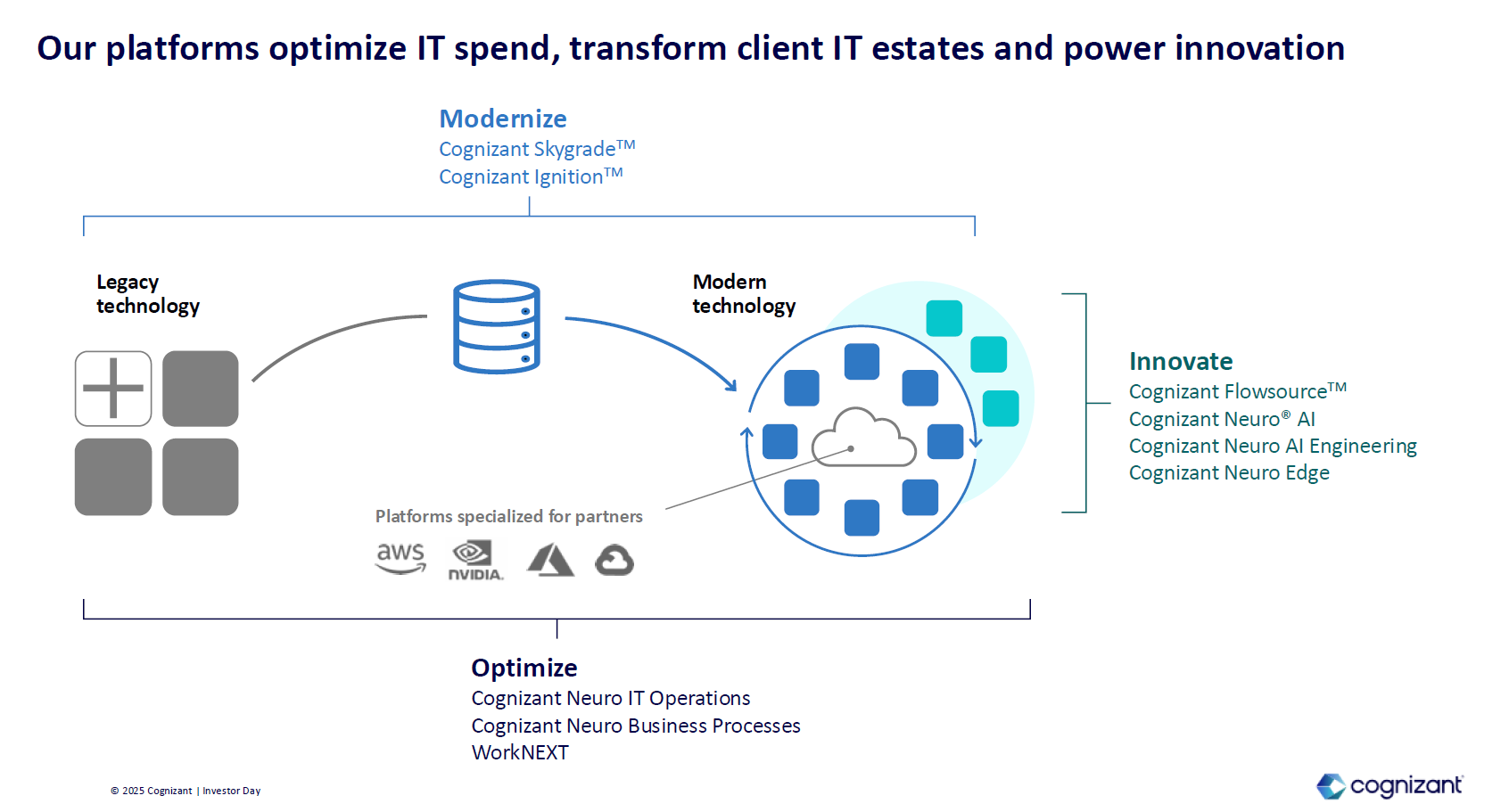
Sharma added that data and model governance is also required on that cloud stack. "These models are not going to manage themselves," he said.
The platforms to manage those models that will ultimately feed into AI agents falls to Babak Hodjat, Cognizant CTO AI.
Speaking at Cognizant's investor day, Hodjat said as companies move from models to agents there's an engineering process to consider. "That moment of switching from a model to an agent is when we've moved to an engineering discipline," he said. "We have to decide what is the responsibilities of this agent, what are the tools that we're going to give it? Where is it sitting? What kind of microservices is it representing? What kind of data isn't representing, it's engineering. It's customization."
Once there are multiple agents autonomously handling tasks interoperability is everything.
He said:
"We are going to build these agent systems as networks with clients. Build some of these agents custom for their specific use cases. They will be provisioning some of these agents and customizing them from third parties, say Agentforce or Agentspace. Everybody has their agents now, and they are plugging into this multi-agent system that gets progressively more powerful."
Hodjat said at Cognizant every unit is building AI agents and "these agents are begging to be connected to each other."
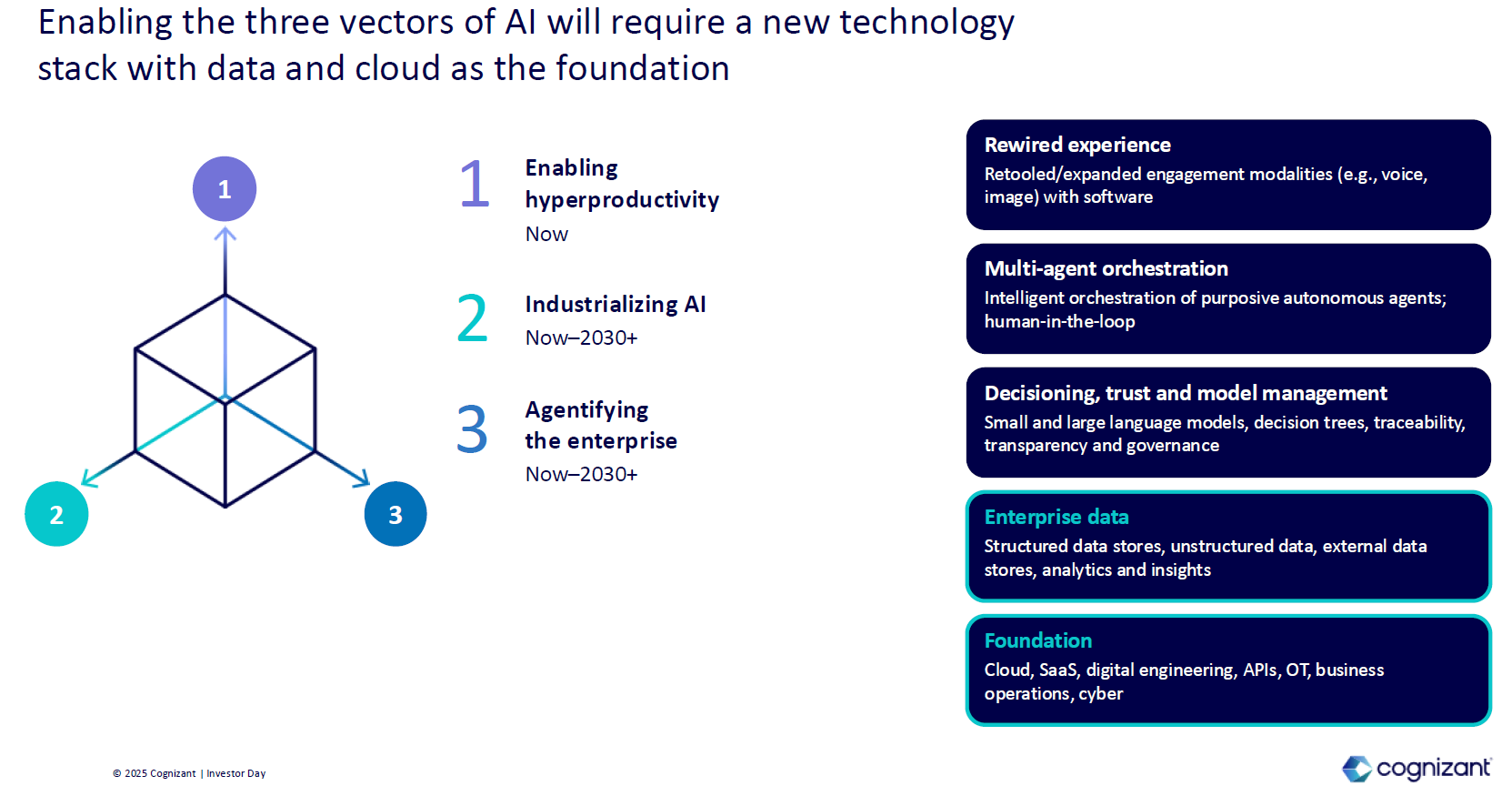
The promise of AI agents communicating is that they can break down silos of data and tasks and create efficiencies. Hodjat said Cognizant is using Neuro AI internally to orchestrate AI agents.
Through a demo, Hodjat showed how agents representing different apps could communicate. AI agents from different divisions create subnetworks based on functions. For instance, an employee can ask about a life change event like having a baby, and agents identify the down chain agents that are required. Ultimately, processes for taking time off, life change events and other HR processes are initiated.
Ultimately, Hodjat said agents will build agents that keep a human in the loop but can execute on optimized processes. That process could include a scoping agent that is grounded in enterprise data and information and can assign tasks to other agents.
Hodjat said:
"This agentification is something that is happening. It's inevitable. It's organic. It has requirements that need to be fulfilled. It's an ongoing process. It's incremental, unlike past moves to the cloud, which was a big lift and shift. You can do agents incrementally and plug in new agents as you go. It requires an interoperability and there's a lot of engineering and custom work. We've recognized early on that multi-agency is the future of the enterprise."


